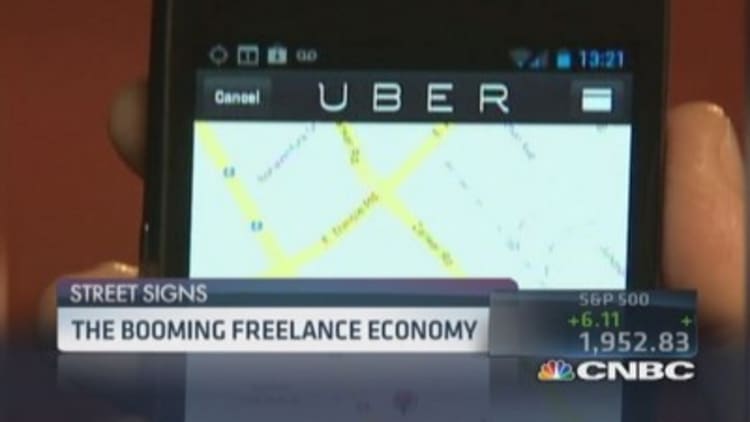A number of start-ups want to help potential employers leverage the skills of some of the 90 million Americans that are "out of the workforce."
New technology platforms are connecting Americans with freelance work and fueling a growing part of the economy that accounts for $1.2 trillion in annual income, according to MBO Partners, a consultancy firm that focuses on what it calls "independent workers."
This year, 35 percent of non-farm and non-government workers will be either full- or part-time freelance, according to MBO, projecting that number will grow to 44 percent in 2020.
Start-ups that connect freelancers with work touch virtually every part of the economy. They go far beyond the example that's perhaps most familiar—UberX and Lyft, which pay car owners to drive. UpCounsel gives individuals and companies access to top attorneys at lower rates than a law firm would charge.
Rev is a freelance transcription and translation service. HomeJoy screens housecleaners who can be hired by the hour. And any stay-at-home mom or college kid that's heading to the grocery store can make extra money working for grocery delivery service Instacart.
Scripted is a marketplace for writers that screens applications from experts in a range of fields who can write. It then connects writers with companies ranging from big brands such as Trip Advisor to small businesses like law practices or doctors' offices, which pay from $50 to $1,000 per article or blog post.
Read More Save the earth—Eat a cup

"They can come to scripted and have the work flow taken care of in one central place," says Scripted CEO Sunil Rajaraman. "They can track their work, provide request edits to the writer, and they're guaranteed the quality of the writing that they get back from us." Scripted says some writers make as much as $55,000 a year. The company has about 500 writers who get paid on average $700 a month.
MBO's CEO Gene Zaino attributes the rise of the freelance economy, in part, by the fact that technology makes it easier for people to work remotely. "Talent has become more open so there's more ability for people to market themselves online and these freelancer market places are better able to match uh the work with the worker," he said.
Read MoreNo more work email on vacation?
Workers are adapting to corporate demands as companies look to cust costs: "Companies have really moved to what I call the 'project economy,' where they are interested in giving work out, not necessarily as a position, but as a project," Zaino said.
There is a downside of being freelance. Workers can suffer from the lack of benefits like health care, and national polls reveal freelancers are more likely to be depressed and anxious. But for people who need the work, and appreciate the flexibility, and companies that are forced to do cost-cutting, the freelance model can be a win-win.
— By CNBC's Julia Boorstin


